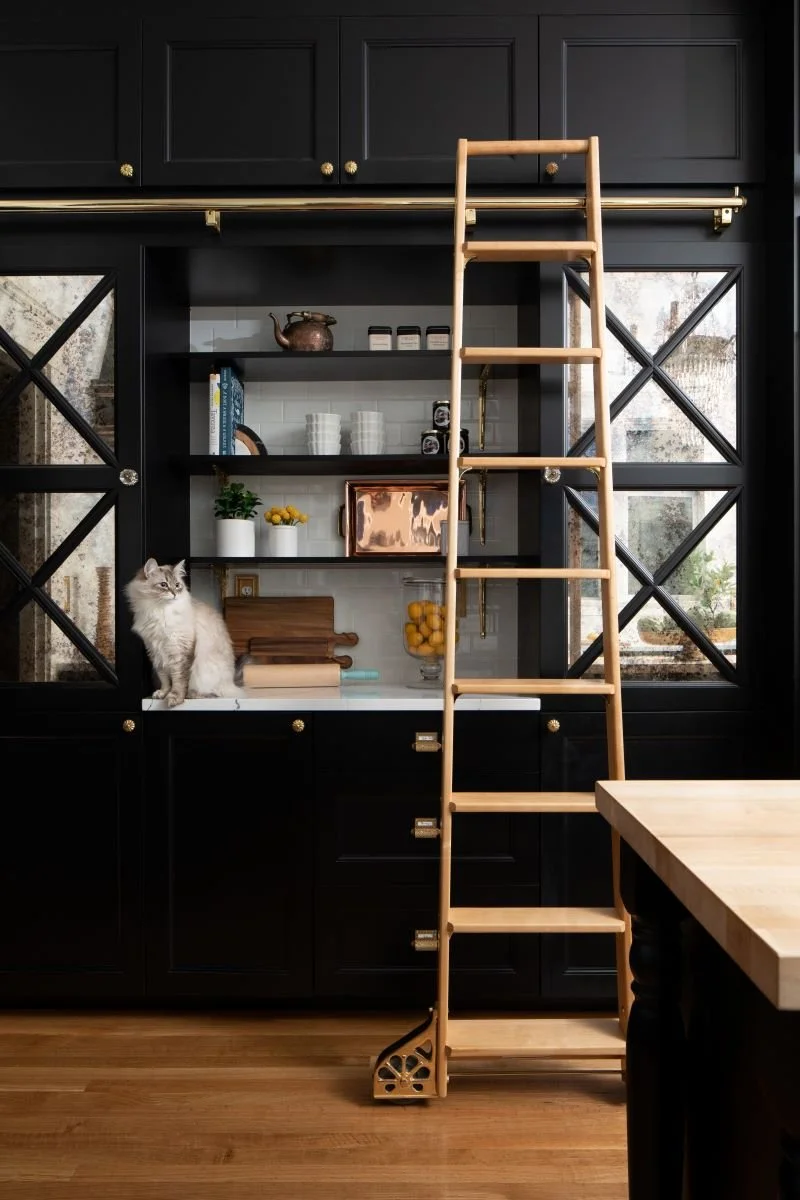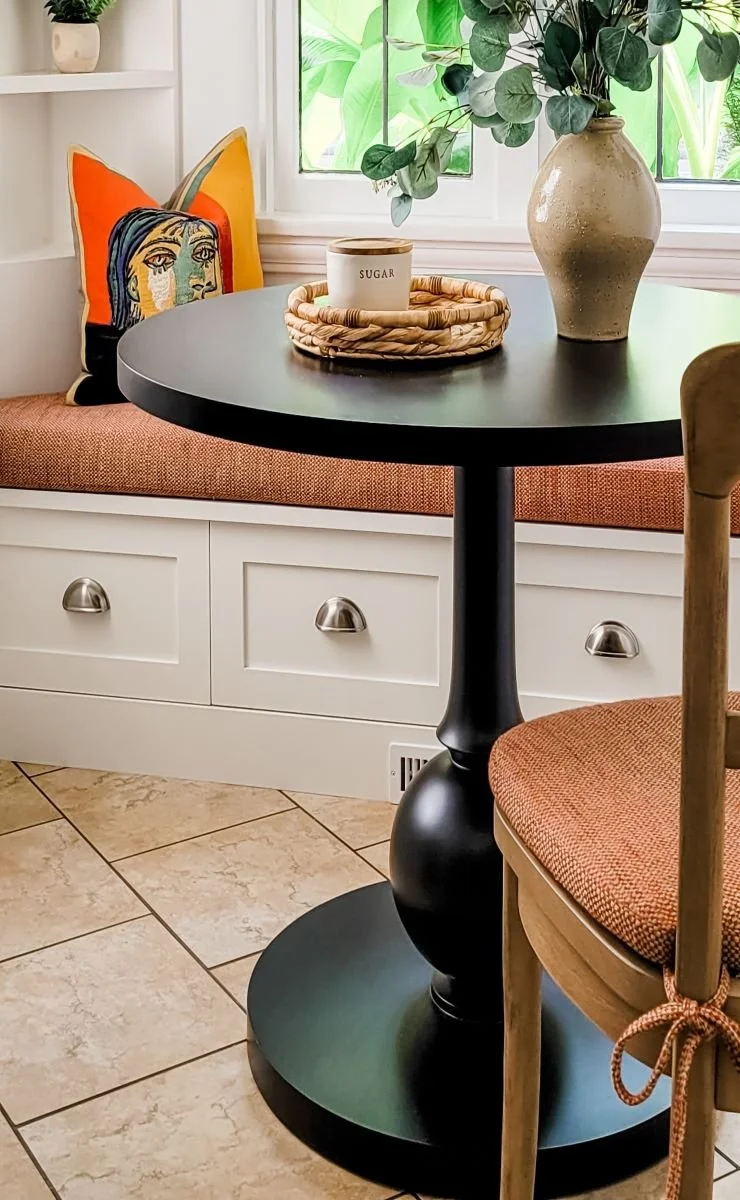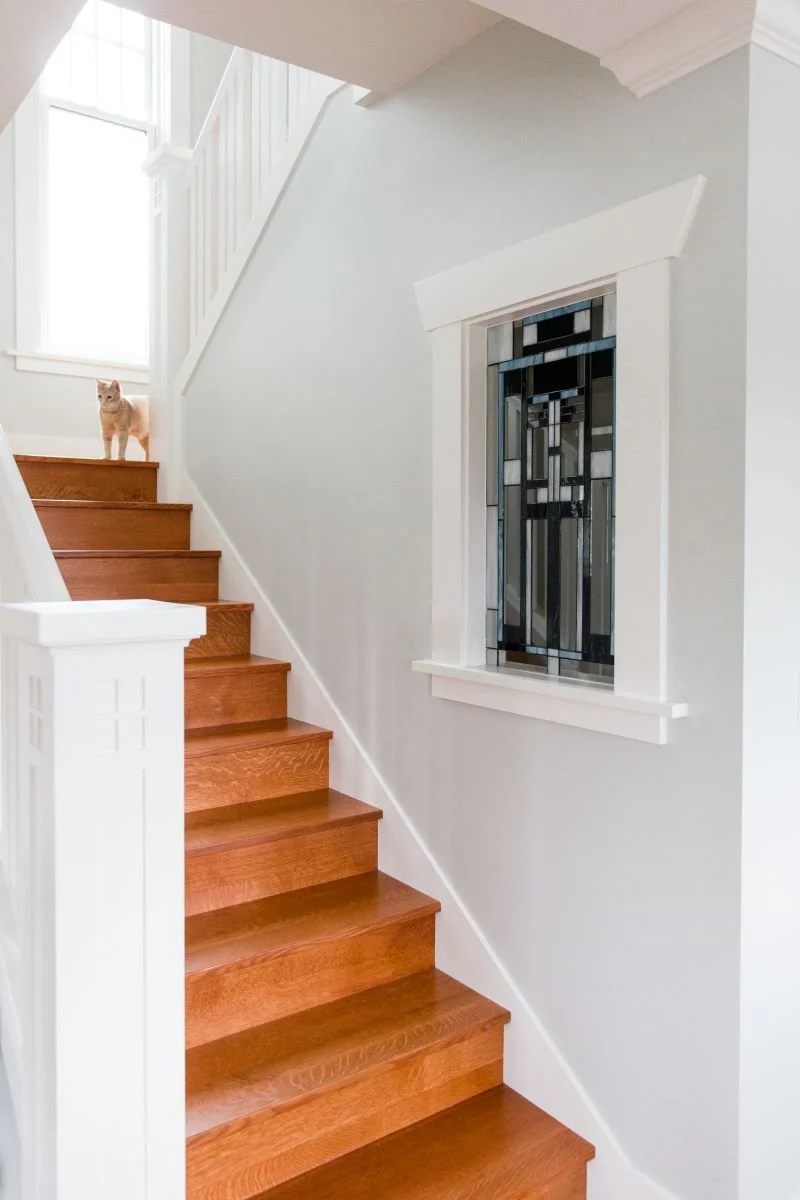Pet-Friendly Home Renovations
When I begin a new design project, I spend time getting to know the people I am working with in order to understand what design solutions will best suit their goals. I want to ensure that there will be a place for everything they need and that the renovated space is flexible as kids grow and circumstances change.
An important part of this discovery period is learning about the family pet or future family pet. The routines and behaviors of our furry friends need to be considered as part of the design solution. From the finishing materials we choose, to how the pet will enter and exit the home, to where they will eat meals, I think through solutions that are smart and feel like an intentional part of the renovation process. Today, I am going to break down furry friend design challenges (and solutions!) that will help guide your pet-friendly home renovation.
Photography by Alex Crook
Flooring solutions
When it comes to your flooring solutions, there are a few details you need to consider. Think about how your pet enters and exits the home. How often do they return to this space wet and dirty? Do they have habits that lead to scratched and damaged floors? You may be dreaming of gorgeous stained wood floors, however, this is one of those tough love times—is that type of floor the best option for your furry best friend? Good news! There are plenty of pet-conscious flooring solutions that you can use in your home.
Resilient flooring
There are some fabulous scratch-resistant and easy-to-clean floor material options like laminate, luxury vinyl, or tile on the market. Some of these products also offer a 100% waterproof and pet-proof guarantee. A resilient flooring solution is a great choice at your pet's point of entry and exit. It makes cleanup a breeze and reduces YOUR stress over the thought of your furry friend damaging your investment.
One of my go-to resilient floor options at the moment is from Coretec Floors. They offer a waterproof, scratch-proof luxury vinyl plank that is absolutely gorgeous! It comes in a variety of wood species and colors, making it easy to find a match for your renovation color palette. Check out the options here and order a few samples to try them for yourself!
Tile is a great choice if you’re hoping to create a transition between your point of entry floor and, perhaps, a stunning stained wood floor throughout the rest of the space. A porcelain tile, specifically, is a low-maintenance and low-cost option. If you are going for a natural vibe, there are some incredible porcelain tiles out there today that mimic the look of stone. You can also get playful with color and pattern at that point of entry. A great place to begin your search for the perfect porcelain is on Tilebar's website. You can filter your search by type, color, and pattern.
If a sustainable solution is your priority, consider linoleum. This durable and eco-friendly option is available in sheet or tile form and comes in a wide variety of colors. You can get creative by combining contrasting color tiles to create a checkerboard floor or go with a single color in a sheet for a streamlined look. You can find over 300 colors and designs by Forbo here.
Photography by Team JGD
Carpet
Installing carpet in your pet-friendly home should come with a warning label. While carpet is warm, cozy, and comfy underfoot, it can also be a pain to clean and maintain when it comes to pets. Trust me when I say that I personally regret installing carpet in my own living room!
While we do our best to keep our adorable Aussiedoodle’s paws clean and her meals in the kitchen, life happens. At least once a week, I find myself blotting stains from the carpet. Not exactly how I want to be spending my time! When it comes to feline pets, their claws must be considered. If your kitty is fond of using your carpet as a scratching post, you will want to find a solution that is cat-friendly. Anderson Tuftex offers some fantastic kitty-friendly carpet options. I have used the Purrfection collection on several projects, and the clients have been happy with the results. Check out Purrfection here.
Pro Tip: Ask your installer to use a moisture-wicking carpet pad to help control odor and prevent moisture from seeping into your carpet fibers and subfloor.
Protect stained wood floors
It can be hard to resist running gorgeous stained hardwood throughout your home. Consider the following tips if you are set on this design direction.
At your pet's entry and exit, add an indoor/outdoor area rug to protect the floors. Personally, I love the options offered by Sisal Rugs Direct. They are neutral, affordable, and very easy to maintain. Our pup tends to lose her lunch occasionally, and it always seems to be by the back door. Our Sisal Rug Direct solution can be picked up, carried outside, and hosed off. It dries quickly and looks as good as new. Please note that not all options can be hosed off. Do your homework and make sure you are getting the right option for your home. As a bonus, Sisal Rugs Direct offers free samples and custom sizing to fit your space perfectly. Check them out here.
Pet access points
How your pet enters and exits your home is an important consideration to bring to the table during the planning phase of your renovation. If you are a fan of the pet door, you will want to investigate options that fit within your home design goals.
I recently discovered a beautiful finish-ready option by Rejuvenation. You can check it out HERE. If you prefer to add a pet door to your existing door, check out THIS option on Amazon. I found the tutorial to be very helpful. If you like the idea of adding a pet door but prefer to avoid installing it on your door, consider adding a solution to your wall.
You can get creative with pet wall flaps and trim them out to coordinate with the rest of the home. Incorporate a custom lockable pet-size door on the interior, making it possible to secure the home in the evening.
Pro Tip: It is important to choose an option that offers a magnetic closure to seal the flap after your pup has exited and a lock solution for nighttime.
Dedicated pet spaces
When completing the space plan for your soon-to-be renovated home, consider how your pet will fit in. Will they need a dedicated place to sleep, bathe, or eat in the rooms you are affecting? There are so many creative solutions floating around the internet illustrating ideas for built-in pet sleeping spaces, eating and drinking zones, and bathing options.
When I am pulling together a design concept for a client, I will create a Pinterest board and populate the board with a collection of imagery that represents the design concept I am trying to convey. Photos say a thousand words! As a bonus for you, I have created a Pinterest board filled with dedicated pet space ideas. Check it out HERE, and feel free to grab any of the ideas that inspire you as you build your own pet-friendly renovation Pinterest board.
Pet safety measures
When it comes to keeping your pet safe, the addition of gates might be on your mind. A gate solution will allow your fur baby to be safely corralled in a pet-proof area in your home. You can pick up baby or pet gates at various sellers online. There are options that include kitty access doors for multi-pet families, tension or fixed installation points, and a wide variety of materials and finish choices. My favorite solution is to choose a custom wood gate that works beautifully with the style of the homes I am designing. There are so many great options available on Etsy. To get you started, check out THIS seller's site.
If you have a puppy in your life, chances are they are chewing things other than their toys and bones! If the puppy is part of the mix during the renovation, you will want to take extra precautions to keep harmful, potentially toxic materials out of the curious puppy’s paws. After the work wraps up, be conscious of electrical cords as a potential chew toy. Some puppies find it particularly gratifying to chew on baseboard molding. Not ideal if you have just installed the base trim of your dreams! If your puppy grows fond of chewing wood, talk to your local pet store or vet about a toy that could be a potential substitute, and plan to keep a watchful eye on the pup until his teething phase has passed.
Storage solutions for pet supplies
I have some tips for you if you are planning to renovate a room where you store pet food and supplies, such as the kitchen or mudroom. If you are storing dry food, identify a food storage container that has a really good seal to keep your pet's food fresh. Plan a dedicated place for the storage container in your kitchen or pantry.
If you are short on walk-in party space but have a tall pantry cabinet unit with roll-out drawers, the bottom drawer is a great place for the heavy food container. You can request heavy-duty drawer glides for that drawer to ensure it holds up. If your renovation includes an entry or exit zone for your pet, consider incorporating a dedicated storage basket or another container to corral waste bags and dry towels for wiping wet paws. Add a hook on the wall for the leash and collar, so you always have those handy.
Pet behavior and training during renovations
Renovations can be stressful for humans AND your pets. If you are living through a renovation with your pet, count on some behavior changes during that time period. Here is a blueprint for minimizing pet stress and anxiety during a home renovation project:
Designate a safe space: Create a designated area where your pets can retreat during noisy or chaotic renovation times. Equip it with their favorite toys, bed, and water.
Stick to a routine: Try to maintain your pet's regular routine as much as possible. Consistent meal times, walks, and playtime can provide a sense of normalcy.
Sound management: Use white noise machines or soothing music to mask the loud construction noises. This can help keep your pets calm.
Introduce gradually: If your pets aren't used to workers or loud noises, introduce them to the renovation gradually. Let them get comfortable with the new sounds and people.
Secure pets during work: While work is in progress, keep your pets safely confined to a pet-proofed area or crate to prevent them from getting underfoot or into hazardous materials.
Frequent check-ins: Spend quality time with your pets during breaks. This reassures them that you're still there for them.
Safety first: Ensure all tools and materials are safely stored to prevent any accidents or injuries to your pets.
Pet sitter or daycare: Consider sending your pets to a pet sitter or daycare during the most disruptive phases of the renovation.
Consult a vet: If your pet's anxiety becomes severe, consult with a veterinarian. They can offer advice and possibly prescribe calming supplements or medications.
Photography by Emily Keeney
Stress-free solutions for you AND your fur baby
A pet-friendly home renovation is possible—with a little strategy and smart planning. From choosing claw-and-paw-resistant flooring to preparing a secure space for your pet during the renovation, these steps will put you (and your four-legged BFF) on the right path toward a joyful renovation.
I hope this article makes you feel even more confident as you begin the renovation process. For even more Renovation Blueprint goodness, sign up for our newsletter so you never miss a hot tip!


